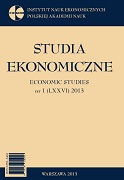Uwagi o potrzebie równowagi metodologicznej w ekonomii
On the Need of Methodological Equilibrium in Economics
Author(s): Bogusław FiedorSubject(s): Economy
Published by: Instytut Nauk Ekonomicznych Polskiej Akademii Nauk
Keywords: descriptive and value judgments; positive and normative economics; economic science; economic methodology; methodological individualism
Summary/Abstract: Discussion about the methodological identity of economics has been present in this sciences since the time of its separation as a discipline from the domain of social sciences. This discussion was focusing on the problem whether within the economic theory one should strive for methodological unity or accept methodological variety. Nowadays, it is mostly, though not exclusively, connected with the question whether and to what extent economics as a science should be a purely positive discipline or it may also contain value judgments which are not inter-subjectively, empirically or logically, verifiable. Against this background, the author raises the following main thesis of the paper: In view of the multidimensional character of determinants of human beings’ economic activity (strongly emphasized already by A. Smith and currently in the behavioral economics and economics of complexity), and taking into account the complexity of social structures within which this activity takes place, it is neither required nor legitimate to strive for “methodological monism” in economics. What we need is equilibrium, understood as a reasonable diversification of methodological approaches, since without this diversification economics faces two threats: 1. Reduction to purely instrumental science, strictly positive one, free of value judgments, but not able (or able to a very limited extent) to recognize real economic phenomena, processes, trends etc.; 2. Reduction to a purely descriptive (empirical) discipline which relatively well reflects economic phenomena and processes but does not contain any scientific generalizations. In conclusion from the proposed interpretation of methodological equilibrium one can formulate two assertions (preliminary theses): 1. There is no need for the distinction between positive and normative economics, but it does imply a reduction of economics to a purely positive discipline in line with the tradition commenced by D. Hume and J.St. Mill, and followed by J.N. Keynes, L. Robbins and M. Friedman. On the contrary, empirical and value judgments should be considered as methodologically equally legitimate, resulting in the equality of rights of positive and normative approaches to economics; 2. To the extent to which theoretical schools within both orthodox and heterodox streams in current economics do not accept a purely positive way of understanding of economic science, the dichotomy orthodox vs. heterodox stream is becoming less significant.
Journal: Studia Ekonomiczne
- Issue Year: 2013
- Issue No: 1
- Page Range: 101-118
- Page Count: 17
- Language: Polish

